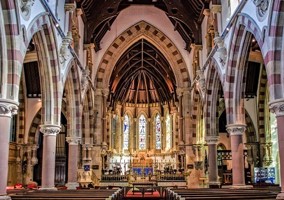In the last hundred years the UK has built an exemplary social welfare system that seeks to provide free access to basic healthcare, education and social services. As such a clear strength of our civil society is the diverse nature of needs that state and individuals seek to meet together.
One thing that many people will not necessarily be aware of though, is the Islamic tradition established an approach to social welfare in 588AD. In that year, the Prophet Muhammad (upon whom be peace) in the midst of establishing the first state for Muslims, revealed to him from God was an injunction that would then seek to govern the responsibility of a civil society emerging.
"Indeed, the Zakat is only [to be given] to the poor and those in relative poverty, and to those administering it, and to those whose hearts are to be reconciled, and to free those in bondage, and to the debt-ridden, and for the cause of God, and to the wayfarer. [This is] an obligation from God. And God is all-knowing, all-wise." – The Quran, Chapter 9, Verse 60.
Eight beneficiaries
Through this injunction a responsibility was established on individuals to take one eighth of their net wealth and give it to the state to manage the aforementioned needs. Eight legitimate beneficiaries were established for the state and the individual to ensure a virtuous cycle is initiated which not only challenges poverty, but its systemic causes.
The poor and those in relative poverty
The injunction starts with identifying those in absolute and relative poverty. This is key as it wants society to not only protect the poor, but those who are struggling to meet their needs.
The administrators
Interestingly the injunction then directs society to invest in those responsible for the system. This is intended to secure the best possible talent and safeguard against the threat of potential corruption.
Those whose hearts are to be reconciled
This is a very interesting category, and in the modern civil society perspective would represent community development and engagement programs. This category directs funds from the Muslim community to non-Muslims to remove the social barriers between the two communities. The focus is on improving understanding and reconciling the hearts of the diverse communities of all societies. This was clearly an important concern for Muslims at the time, as they were the newest community living amongst established Jewish, Christian and pagan communities.
Those in bondage
This injunction sought to free those in slavery. Islam called for Muslims to purchase the freedom of those in slavery and venerated this as a key concern for civil society, and a priority. In the modern context this would be extended toward those in modern slavery and forced sexual exploitation where people are essentially in a social bondage.
The debt ridden
Islam venerates equity over debt, and therefore has a deep-rooted concern to liberate people from debt. It is recognised that debt can overcome people and completely strip their cerebral freedom, and therefore calls for society to work together to free people from debt.
The cause of God
This is calling for the cost of the armed forces to be a shared concern. Just like in most economies the cost of the armed forces is simply taken from the taxes and is left to the country’s leadership to decide, Islam seeks to create a communal responsibility through Zakat funds. This is one of the categories which really helps one understand how Zakat is really the basis of a welfare state, as this is clearly only something that can be handled at a state level.
The wayfarer
In the modern context this essentially refers to refugees. Islam recognises the plight of refugees and seeks to ensure that a communal effort to help them settle or find safety is taken by society. Recognising their specific vulnerability Zakat calls for them to be managed outside of the first two concerns of poverty and relative poverty, even though they may access funds from those categories also.
In the absence of a state and Zakat being handled in such a holistic way, we find Muslim charities across the globe focussing on one or two of the categories that Zakat is permitted to be used for.
We see increasingly major non-faith institutions are looking to see what role they can play in the collection/distribution of Zakat. At NZF Worldwide we are working with multiple UN agencies to help them find a role in working with Zakat, as clearly the challenges in the world today are such, that we need a joint up approach.
Civil society will be much stronger as we look at what value Zakat can add to responding to the challenges of today. This needs Zakat collectors to explore new partnerships and non-faith institutions to become more comfortable with the role of faith-based funds and the basis upon their contribution.
Azim Kidwai is director of NZF Worldwide
Faith Charities Week is live! Watch the sessions, view the agenda and register for the event here: https://www.accelevents.com/e/faithweek
Related articles












